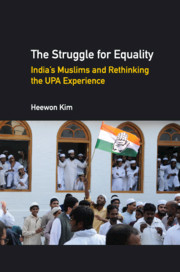Book contents
- Frontmatter
- Dedication
- Contents
- List of Tables and Figures
- List of Abbreviations
- Acknowledgements
- Introduction
- 1 Opening Up the ‘Black Box’ of Public Policy: Towards an Institutional Analysis of India's Policies on Religious Minorities
- 2 Constitution-Making, Equality of Opportunity and Religious Minorities: Reassessing the Critical Juncture
- 3 The UPA in Power: The New Equal Opportunities Framework, Religious Minorities and the Limits of Change
- 4 UPA, Muslims and Public Sector Employment: Assessing the Record
- 5 UPA, Muslims and Service Delivery
- 6 UPA, Muslims and the Communal Violence Bill
- Conclusion
- Appendix Recruitment of minorities in central government departments and public sector undertakings
- Bibliography
- Index
1 - Opening Up the ‘Black Box’ of Public Policy: Towards an Institutional Analysis of India's Policies on Religious Minorities
Published online by Cambridge University Press: 12 February 2019
- Frontmatter
- Dedication
- Contents
- List of Tables and Figures
- List of Abbreviations
- Acknowledgements
- Introduction
- 1 Opening Up the ‘Black Box’ of Public Policy: Towards an Institutional Analysis of India's Policies on Religious Minorities
- 2 Constitution-Making, Equality of Opportunity and Religious Minorities: Reassessing the Critical Juncture
- 3 The UPA in Power: The New Equal Opportunities Framework, Religious Minorities and the Limits of Change
- 4 UPA, Muslims and Public Sector Employment: Assessing the Record
- 5 UPA, Muslims and Service Delivery
- 6 UPA, Muslims and the Communal Violence Bill
- Conclusion
- Appendix Recruitment of minorities in central government departments and public sector undertakings
- Bibliography
- Index
Summary
Introduction
The election of a Congress-led UPA coalition government in 2004 surprised most analysts, and the appointment of Manmohan Singh as Prime Minister was symbolic of a new approach towards India's religious minorities. For some, the UPA's policies, institutional innovations and executive decisions in its first term represented a ‘paradigm shift’ in how equality of opportunity is understood in India (Khaitan 2008). This shift marked a dramatic break, especially for religious minorities, who had disproportionately suffered social exclusion and discrimination. The SCR, for example, by recognising the social and economic marginalisation of India's Muslims highlighted the ‘development deficit’ suffered by the community since Independence. The RMCR, probably the most radical official document on India's minorities since 1947, drew a pointed reference to ‘inequalities’ which excluded disadvantaged religious minorities, such as Christians and Muslims, from reservation in employment and education. In brief, these and other initiatives appeared to suggest that the UPA government would forge a new social contract with India's religious minorities.
The purpose of this book is to explain the UPA's failure to translate its manifesto commitments for religious minorities into effective policies. The UPA's shortcomings, it argues, are similar to the experience of all governments in India in implementing public policy in this area, especially towards Muslims. This weakness is not the reluctance of leadership, or an inability to formulate appropriate policies, but to secure broader legitimacy for such policies within the Indian political system and overcome historically institutionalised opposition to such policies from important political and institutional constituencies that see such change as a threat to the established constitutional arrangements. To explain the UPA's experience, this work is located within a historical and institutional context of how the rights of religious minorities since 1947 have been framed, how they were institutionalised and how they have evolved in a path-dependent way that militates against substantive policy change. Combining historical causation with institutional policy analysis, this book aims to bring new insights to the understanding of the UPA's policy performance and to the approach of governments of all political hues to religious minorities, particularly Muslims.
- Type
- Chapter
- Information
- The Struggle for EqualityIndia's Muslims and Rethinking the UPA Experience, pp. 16 - 38Publisher: Cambridge University PressPrint publication year: 2019



